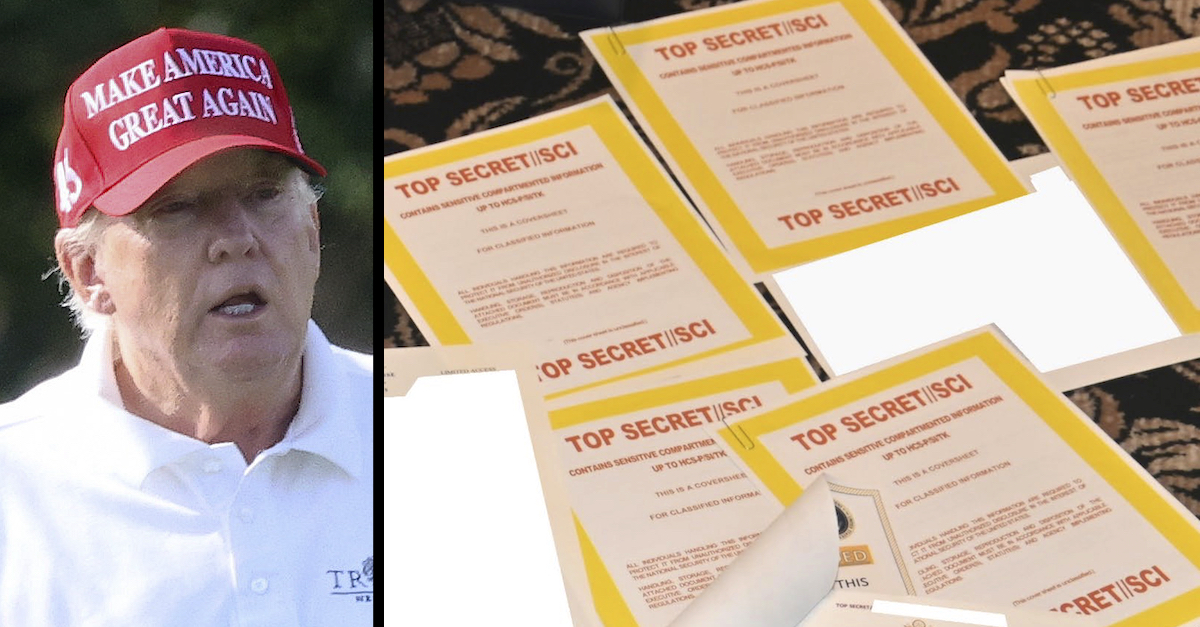
On the left, former President Donald Trump was seen golfing on Sept. 13, 2022. Federal prosecutors filed a photo of documents recovered from Mar-a-Lago in early August 2022. (Photo of Trump by Win McNamee/Getty Images; photo of Mar-a-Lago documents via a federal court filing.)
In a just-unsealed filing, the Department of Justice asked the special master reviewing thousands of documents seized from Mar-a-Lago for attorney-client and other privileges to force former President Donald Trump to verify the inventory through a sworn affidavit.
Such an order would compel Trump to affirm or dispute the authenticity of the records that the FBI seized from Mar-a-Lago in August on the record and under penalty of perjury. It would also make the former president provide evidence to his insinuations that documents may have been planted.
“The Special Master has received an affidavit of accuracy from the government. Since the Court appointed the Special Master to ensure fairness, integrity, and even-handedness in the review process […], Plaintiff should be required to verify or correct the property inventory just as the government has done,” the Justice Department’s National Security Division chief Jay I. Bratt wrote in a 20-page filing.
Filed under seal on Nov. 8 and released publicly on Monday, the document summarizes the government’s arguments as to the legal issues before Senior U.S. District Judge Raymond Dearie, the special master recommended by Trump and appointed by U.S. District Judge Aileen Cannon to preside over the privilege review.
In late September, Judge Cannon, a Trump appointee, previously shielded the former president from Dearie’s order that would have made him lodge objections to the inventory, its descriptions or its contents.
But Cannon’s order, on its face, was a temporary measure, stating that she was only overruling Dearie “at this stage.”
“There shall be no separate requirement on [Trump] at this stage, prior to review of the seized materials, to lodge any ex ante final objections to the accuracy of [the government’s] inventory,” Cannon wrote.
The Justice Department pointed to the carefully qualified language of Cannon’s ruling, noting that it “left open to the Special Master to reimpose the requirement that Plaintiff verify or correct the property inventory after Plaintiff had an opportunity to review the seized materials.”
“The Court’s September 29 , 2022 order did not disagree in principle with the requirement that Plaintiff verify or correct the property inventory,” the government’s legal brief states. “Rather, the Court relieved Plaintiff from the requirement to verify or correct the inventory before he had an opportunity to review the seized materials.”
Some two months later, the government says, that time has come.
“Now that Plaintiff has reviewed the seized materials and claimed the overwhelming majority of them to be his personal records, considerations of fairness, integrity, and evenhandedness require Plaintiff to do what the government has done — namely, verify the property inventory or correct it if he believes it to be in error,” the brief continues. “A fair process requires both parties to ensure that the Special Master is adjudicating disputes over property actually seized from Mar-a-Lago.”
Though broad passages of the ruling remain redacted, the government revealed that Trump only claimed a sliver of the files under review qualify for attorney-client or executive privilege.
“Plaintiff has asserted attorney-client privilege only as to one document out of the 2,916 documents at issue here, and Plaintiff has asserted executive privilege as to only 121 documents,” the filing states. “As to the remaining 2,794 documents, Plaintiff does not assert any privilege that would bar the government’s further review and use of these materials for purposes of its ongoing criminal investigation.”
The Justice Department wants an order letting them use those files for their ongoing investigation, on top of the roughly 100 documents with classification markings that the 11th Circuit Court of Appeals let them use already. The government argues that Trump’s lawyers have provided an “overbroad” description of his personal records; the recently unsealed brief from Trump’s legal team suggests that he believes “pardon packages” qualify as personal rather than presidential records.
“Finally, the parties have also been directed to brief the matter of ‘[w]hether certain groups of documents (e.g., pardon packages) are Presidential records.'” Trump’s attorney Lindsey Halligan wrote. “There is no basis to conclude that any of the materials transported to Mar-a-Lago are Presidential records. As described above, once a President has designated a record as personal – as happened here – the inquiry ends regardless of the content of a given document. As discussed, to the extent NARA disagrees with the process of designation, its remedy is to bring a civil lawsuit.”
The government says that the special master should reject this sweeping definition of “personal.”